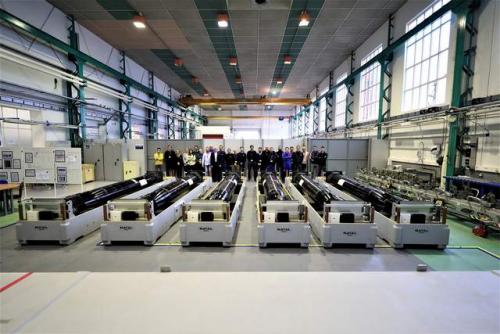The United States should send vaccines not bombs around the world
China and Russia have been engaging in “vaccine diplomacy,” delivering free or discounted vaccines to nations in need. The U.S. is far behind.
- Opinión

The COVID-19 pandemic demands a collective, global response of the sort that has few parallels in human history. The 132 million confirmed COVID-19 cases worldwide and 3 million deaths are likely underestimates. More contagious variants have emerged, causing an alarming surge in cases. Viruses don’t respect borders, and, in our increasingly interconnected planet, the need for a cooperative approach to this public health emergency is imperative. The United States, the world’s wealthiest nation, has a moral responsibility to facilitate availability of COVID-19 vaccines and treatments worldwide. Instead, the Biden administration is engaging in vaccine nationalism, stockpiling vaccines and blocking efforts to even temporarily suspend COVID-19 vaccine patents held by for-profit pharmaceutical corporations. Meanwhile, it’s business as usual for the U.S. weapons industry, which annually peddles over $160 billion in arms and ammunition around the world.
President Joe Biden promised 100 million vaccinations in his first 100 days in office, and accomplished that in almost half that time. Vaccine eligibility requirements for people aged 16 and over are likely to be removed nationally within weeks, and trials on children as young as six months have already begun. Biden facilitated a deal between competitors Merck and Johnson & Johnson to accelerate production of the J&J single-shot vaccine, and Pfizer just announced development of an oral COVID-19 treatment. But if the virus is allowed to run rampant elsewhere in the world, potentially mutating into more lethal variants, no one is safe.
European vaccinations are lagging. Haiti has not yet received a single dose of the vaccine, and scores of other countries from Mali to Papua New Guinea to Armenia have only administered a few hundred doses to date. South Africa, where one of the new, more deadly coronavirus variants was first detected, has only vaccinated about 0.5% of its population of almost 60 million. India, a major vaccine manufacturer, abruptly halted vaccine exports in order to address its own record-breaking surge in COVID-19 cases.
Part of the blame lies with former President Donald Trump, who effectively sabotaged the initial global pandemic response. First he began the process of withdrawing from the World Health Organization, then refused to participate in COVAX, the global cooperative effort to guarantee fair, fast and equitable distribution of COVID-19 tests, treatments and vaccines. President Biden immediately recommitted to the WHO, and has pledged $4 billion to COVAX.
These are a good start, but fall far short of what’s needed. China and Russia have been engaging in “vaccine diplomacy,” delivering free or discounted vaccines to nations in need. The U.S. is far behind, donating several million doses of Astrazeneca that were in danger of expiring. A more important step for the Biden administration to take would be to drop objections to the temporary waiver of intellectual property rights on COVID-19 vaccines at the World Trade Organization. This would allow rapid scaling up of affordable vaccine production globally — akin to the Merck/J&J deal, but on a grand scale that the severity of the pandemic demands. The initial appeal for the waiver from India and South Africa has been joined by over 60 other nations. But, as the WTO process requires decisions to be unanimous, one dissenting nation, like the United States, can block progress, protecting the pandemic profiteers.
While the U.S. may be failing in deploying the soft power of vaccine diplomacy, it continues to excel in deploying hard power. The Stockholm International Peace Research Institute reported that global arms sales grew by 8.5% from 2018 to 2019. “In 2019 the top five arms companies were all based in the United States: Lockheed Martin, Boeing, Northrop Grumman, Raytheon and General Dynamics,” SIPRI reported, adding, “These five together registered $166 billion in annual arms sales. In total, 12 US companies appear in the top 25 for 2019, accounting for 61 per cent of the combined arms sales of the top 25.” Inexplicably, the Pentagon announced this week, just days after the world marked International Mine Awareness Day, that they would continue Trump’s policy of expanding the use of landmines around the world.
Public notices from the Pentagon’s Defense Security Cooperation Agency confirm that U.S. weapons sales continue apace. Brazil has just bought $70 million worth of torpedoes from Raytheon, for example. This, as Brazil faces a devastating surge in COVID-19 deaths, with hospitals running out of basic supplies and grave diggers working into the night to make room for the mounting corpses. Imagine if that $70 million were invested in battling the pandemic instead of other countries.
Instead of selling weapons of war, the United States should make global public health our number one priority. It is by far the most effective way to enhance our national security.
The original content of this program is licensed under a Creative Commons Attribution-Noncommercial-No Derivative Works 3.0 United States License. Please attribute legal copies of this work to democracynow.org
https://www.democracynow.org/2021/4/8/the_united_states_should_send_vaccines
Del mismo autor
- Putin’s war on Ukraine could spark a nuclear catastrophe 04/03/2022
- La persecución de Biden contra Julian Assange 18/01/2022
- Biden’s persecution of Julian Assange 06/01/2022
- ¿Reconstruir mejor o construir más bombas? La elección es clara 13/12/2021
- Facebook Papers: cumplicidade no ódio, nas mentiras e na violência 28/10/2021
- Es hora de eliminar a Facebook de nuestra lista de amigos 11/10/2021
- El espía que se metió en tu teléfono 20/09/2021
- De Kabul al río Bravo, Estados Unidos crea crisis de refugiados 31/08/2021
- Después de décadas de guerra, el pueblo afgano merece la paz 23/08/2021
- Código rojo: la emergencia climática exige una acción inmediata 16/08/2021








